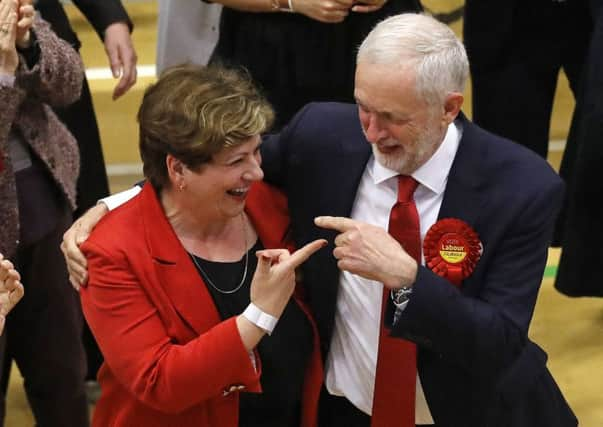General Election 2017: May's snap election gamble backfires


The Prime Minister’s leadership was today under intense pressure following a disastrous result which saw Jeremy Corbyn’s Labour Party thwart her plan to substantially increase the Conservative majority.
In Scotland, the electorate also dealt a blow to Nicola Sturgeon with what will be seen as an anti-independence referendum vote, leading to a series of high-profile nationalists losing their seats, including the SNP Westminister leader Angus Robertson and former First Minister Alex Salmond.
Advertisement
Hide AdAdvertisement
Hide AdThere was good news for Labour with Jeremy Corbyn leading the party to its best General Election result since Tony Blair’s leadership. In the Lothians, the party gained East Lothian and Midlothian from the SNP, and saw Ian Murray returned in Edinburgh South with a massive majority of 15,514.
The Lib Dems also enjoyed gains as Christine Jardine took the Edinburgh West seat with a comfortable majority of 2988, beating the SNP’s Toni Giugliano into second place. As the final votes were being counted, Mrs May was facing the prospect of losing her majority and it was clear she would fall embarrassingly short of her ambition to achieve a Conservative landslide.
Having called the election to strengthen her hand in the Brexit negotiations, Mrs May’s failure to deliver enough Conservative votes and her inability to run a successful campaign will lead to questions over her political future.
Last night bookmakers William Hill had installed Foreign Secretary Boris Johnson as the favourite to replace her as Tory leader with odds of three to one.
Advertisement
Hide AdAdvertisement
Hide AdDespite initial predictions that Mrs May would demolish Mr Corbyn at the polls, the UK Labour leader ran a far more effective campaign and was rewarded with significant gains for his party.
This morning Mr Corbyn called for Mrs May’s resignation, saying that voters had opted for hope and “turned their backs on the politics of austerity”. Senior Labour figures suggested Mr Corbyn could form a minority administration by seeking support from the smaller parties, but ruled out a formal coalition.
The UK Labour leader said Mrs May should “go and make way for a government that is truly representative of this country”.
The Labour frontbencher Emily Thornberry said Mr Corbyn would be looking to form an administration.
Advertisement
Hide AdAdvertisement
Hide Ad“We will put forward our alternative manifesto – our alternative vision for Britain, which has been very popular with the public and we would call on MPs from other parties to vote for it,” she said.
As Mrs May arrived in the hall for the result of the Maidenhead count she ignored questions from reporters over whether she was going to resign. In a notably downbeat speech, she said the country needed a “period of stability”, but made no mention of forming a government.
“Whatever the results are the Conservative Party will ensure that we will fulfil that duty in ensuring that stability, so that we can all as one country go forward together,”
Mrs May’s failure to secure a convincing majority will throw major doubts over the Brexit negotiations, which are due to begin in just ten days’ time. Instability at Westminster will throw the two-year negotiating timetable into disarray.
Advertisement
Hide AdAdvertisement
Hide AdOn a night of high drama the former Lib Dem leader and former Deputy Prime Minister Nick Clegg lost his Sheffield Hallam seat.
North of the Border, Ms Sturgeon’s bid to hold a second independence referendum was the defining issue. Although the SNP remained Scotland’s largest party, Ms Sturgeon’s opponents profited handsomely from opposition to her plan.
Ms Sturgeon said she would not make any “rash decisions” on a second referendum and would “take time to reflect” on the prospect of another poll. Under Ruth Davidson’s leadership, the Scottish Conservatives had a successful night, with Douglas Ross taking Mr Robertson’s Moray seat in a major blow for the SNP.
Mr Robertson was one of a series of high-profile SNP casualties on a night that also saw Kezia Dugdale’s Scottish Labour Party comfortably surpass expectations at the SNP’s expense.
Advertisement
Hide AdAdvertisement
Hide AdThe SNP’s Westminster chief whip Mike Weir became the first big Nationalist casualty, losing Angus, a seat that has been a Nationalist stronghold for decades, to the Conservatives.
Another upset came in Ochil and South Perthshire, where the SNP politician Tasmina Ahmed-Sheikh was beaten by Luke Graham of the Tories.
The SNP’s John Nicolson also lost East Dunbartonshire to Jo Swinson of the Lib Dems.
The Lib Dems also profited in Caithness, Sutherland and Easter Ross and Edinburgh West, where they defeated the SNP. Labour’s Gerard Killen unexpectedly took Rutherglen from Margaret Ferrier of the SNP.
Advertisement
Hide AdAdvertisement
Hide AdLabour also took Midlothian against the odds as Kezia Dugdale’s party performed much better than expected north of the Border, taking seats at the expense of the SNP.
Labour won its target seat of East Lothian, unseating the SNP’s George Kerevan.
Kezia Dugdale said: “The SNP vote is crumbling in their urban heartlands. This is a very, very bad night for the SNP.”